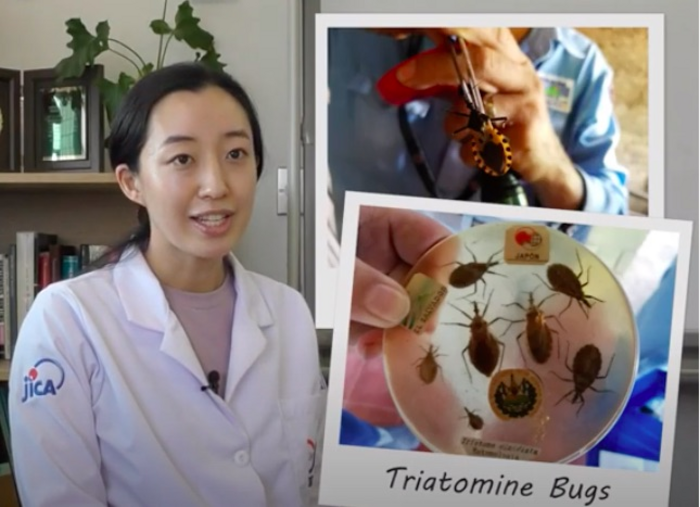One thing you might want even less than a ‘kiss’ from a kissing bug is its feces. Scientifically referred to as triatomine bugs, these blood-sucking insects can carry in their feces and pass on to humans the parasite Trypanosoma cruzi that causes Chagas disease, a lifelong infection that takes a heavy toll on community health in poor populations, particularly in El Salvador.

Credit: Osaka Metropolitan University
One thing you might want even less than a ‘kiss’ from a kissing bug is its feces. Scientifically referred to as triatomine bugs, these blood-sucking insects can carry in their feces and pass on to humans the parasite Trypanosoma cruzi that causes Chagas disease, a lifelong infection that takes a heavy toll on community health in poor populations, particularly in El Salvador.
Efforts to eliminate Chagas disease require active and effective vector control measures in response to a change of the principal triatomine vector species. Osaka Metropolitan University scientists and their Salvadoran colleagues addressed this need with their two-year nationwide survey on vector infestation, results of which signaled potential active transmission of Chagas disease and identified areas where vectors have high parasite infection rates, thereby strengthening vector control capabilities in the country. Their findings were published in Infectious Diseases of Poverty.
One of 20 WHO-designated neglected tropical diseases, which are prevalent among the world’s impoverished communities but often draw limited attention, Chagas afflicts more than 7 million people living in Lantin America. Though not usually resulting in death, this disease has lasting adverse impacts, underlining the need for regular attention to control measures for current and emerging vector insects (i.e., triatomine bugs). However, previous vector surveillance and control programs, including routine spraying, were conducted indiscriminately without an objective risk evaluation of vector infestation and parasite prevalence, raising questions about their efficacy.
The research team led by Professor Yasutoshi Kido, in cooperation with the El Salvador Ministry of Health and local governments, addressed this shortcoming by conducting a targeted house-to-house survey of vector species throughout El Salvador. With this purposeful sampling method, the team selected surveyed houses based on their materials and triatomine infestation history before searching for triatomine bugs there. Morphological examination was conducted to identify the insects’ species. Feces from the collected insects were examined by microscope to detect parasite infection. PCR was performed to confirm the presence of Trypanosoma cruzi.
The survey showed that the infestation rate of the principal vector species was as high as 34% (107 out of 311 surveyed houses) and the prevalence of the parasite Trypanosoma cruzi infection in these insects was roughly 10%. Whilst these particular triatomine bugs were ubiquitous across the country, the Trypanosoma cruzi infection was unevenly distributed among the 14 Salvadoran departments (administrative divisions). The findings signal potential active transmission of Chagas disease, suggesting the need for continued and more selective vector control efforts, with particular attention and resources allocated to areas with high infection rates.
This research signifies an intensive collaboration between the OMU scientists and the local and national governments of El Salvador. “This research would not have been possible without the support we received from the Ministry of Health and local governments of El Salvador,” expressed Professor Kido.
Co-first author Yuko Nitahara, M.D., concluded, “Our findings are expected to contribute to cost-effective methods of Chagas vector control, making an advance in our ongoing battle against this real-world neglected tropical disease.”
###
About OMU
Osaka Metropolitan University is a new public university established by a merger between Osaka City University and Osaka Prefecture University in April 2022. For more science news, see https://www.upc-osaka.ac.jp/new-univ/en-research/, and follow @OsakaMetUniv_en, or search #OMUScience.
Journal
Infectious Diseases of Poverty
DOI
10.1186/s40249-022-01008-5
Method of Research
Survey
Subject of Research
Animals
Article Title
Re-emerging threat of Trypanosoma cruzi vector transmission in El Salvador, update from 2018 to 2020
Article Publication Date
9-Aug-2022




